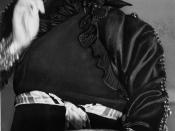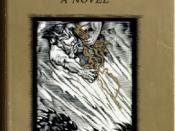Their Eyes Were Watching God, was panned by the public, and later shelved on bookcases to gather dust. By passing over the story of Janie Crawford, readers lost a remarkable novel, not about the injustices whites had committed on the blacks, but the many paths a human life can take on the journey through life. Essentially, Their Eyes Were Watching God is a novel that follows the character of Janie Crawford as she evolves through each unique event that occurs in her life, leading to the strong theme of self-discovery that the author vividly portrays through metaphorical language.
First published in 1937, Their Eyes Were Watching God is a product of the Harlem Renaissance, a time in which African-Americans contributed large volumes of creativity to the American culture. Richard Wright, a contemporary of Hurston=s, said that her novel was themeless and meaningless, while at the same time, W.E.B.
DuBois, founder of the NAACP, was pushing the Harlem Renaissance notion of "twoness," a belief that one had to be award of their identity. A reader can draw a strange paradox between "twoness" and "themeless" when discussing Hurston's novel, especially since it is evident that Their Eyes Were Watching God has a prevalent self-discovery theme, much like "twoness." It can be inferred that Hurston put her opening line where she did to draw attention to the difference between "Ships at a distance have every man's wish on board (1)," while ". . . women forget all those things they don=t want to remember, and remember everything they don=t want to forget (1)." Men dream and dream forever, while women dream and then do something about it. As one of the few women in the Harlem Renaissance, Hurston wrote her novel, while the men criticized and then continued to...



Title wrong
Hi, the book was written by Zora Neale Hurston, not Janie Crawford. Janie Crawford is the main character.
0 out of 0 people found this comment useful.